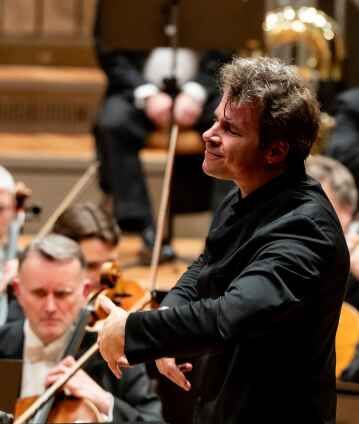Jakub Hrůša conducts Dvořák’s Stabat mater

For the Czech conductor Jakub Hrůša, Antonín Dvořák’s Stabat mater is a “wonderful gift”. The composition occupies a prominent position among the numerous settings of the medieval text. In it, Dvořák came to terms with his grief at the death of three of his children and composed a work in which dramatic outbursts alternate with passages full of tenderness, closing with an ecstatic vision of resurrection.
In 1886, Antonín Dvořák reported to his publisher the great success of his Stabat mater in England, America and even Australia. At the same time, he complained about the modest interest in German-speaking countries. To this day, the composer’s symphonies, solo concertos and string quartets are much better known in Germany than his sacred works. The Berliner Philharmoniker have performed the Stabat mater only three times in their long history – most recently in 1981, the year conductor Jakub Hrůša was born. This is a coincidence, of course, but a happy one: Hrůša, who is conducting the orchestra in this concert, is particularly fond of the work.
The Stabat mater was composed in the 1870s, when Dvořák first gained recognition in his homeland. Before that, most of what he had written during years of hardship lay gathering dust. A performance of the work at the Royal Albert Hall in London paved the way for Dvořák’s international fame. The period of his breakthrough was also one of personal family tragedy for the composer: his three eldest children died between 1875 and 1877. By turning to sacred music – without a commission – the devout Catholic was also able to express his personal grief.
The Stabat mater is a medieval poem of the Catholic liturgy. It depicts Mary’s suffering during the crucifixion of her son Jesus. The final verses are about the longing for paradise. In his ten-movement composition for choir, orchestra and four solo voices, Dvořák sensitively elaborates various aspects of the text with richly varied orchestration. In doing so, he combines musical influences ranging from Baroque forms to Richard Wagner’s elaborate harmonies.
The quartet of soloists is led by the American soprano Corinne Winters, who was a sensational success at the 2022 Salzburg Festival in Janáček’s opera Káťa Kabanová.
© 2023 Berlin Phil Media GmbH
Related interview
Artists
Our recommendations
- Kirill Petrenko conducts Mendelssohn’s “Elijah”
- Gustavo Dudamel conducts Mahler’s Second Symphony
- Concert celebrating the 25th Anniversary of the Fall of the Berlin Wall
- Simon Rattle conducts Beethoven and Mendelssohn at the Waldbühne
- Bach’s “St Matthew Passion” with Simon Rattle and Peter Sellars
- Christian Thielemann conducts a concert “à la française”